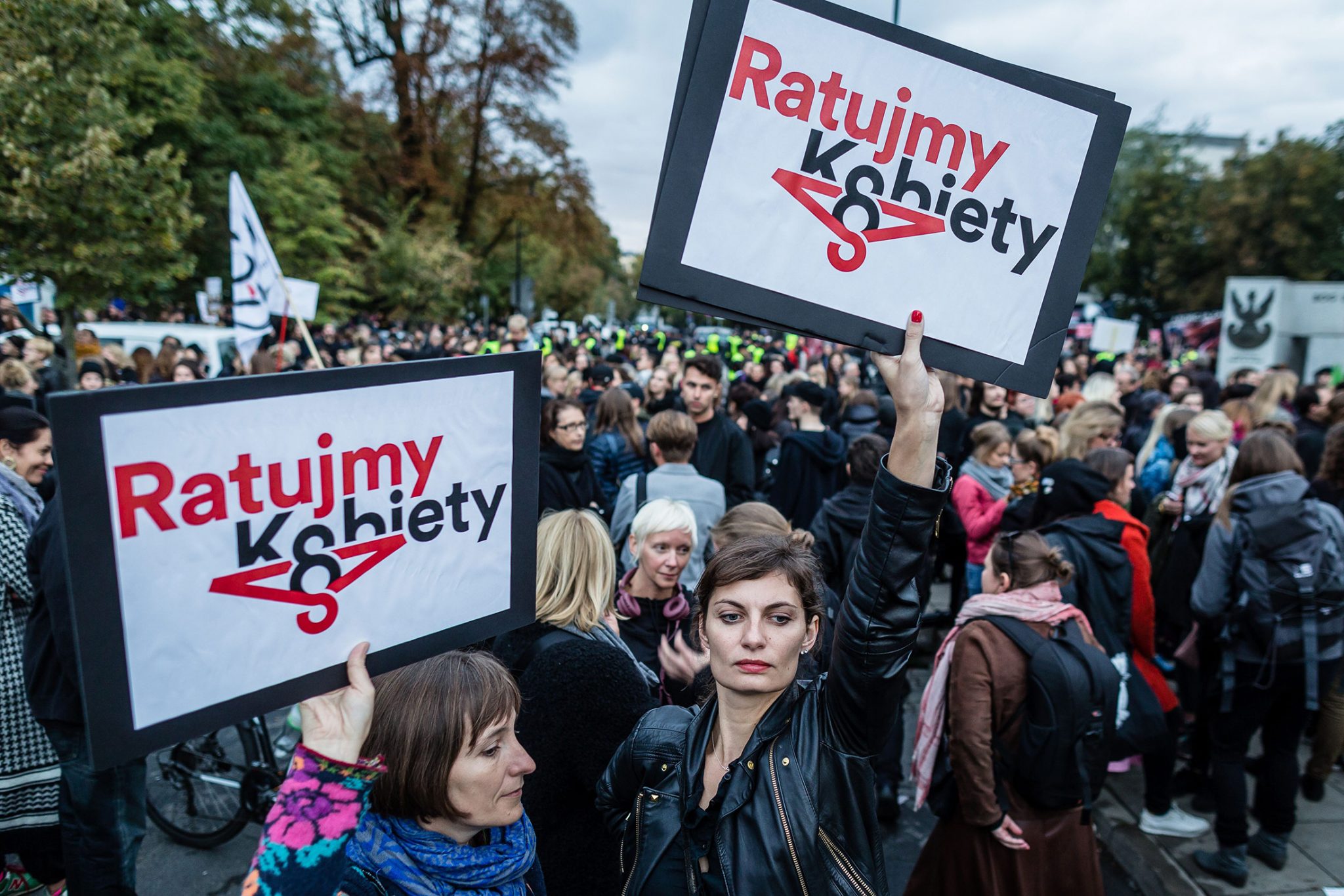
Over the last weeks Poland has witnessed an unprecedented mobilisation of women against the tightening of the abortion law. Our colleague Gert Röhrborn from our Warsaw office sheds light on recent events.
Last week Poland was yet again subject of a special debate at the European Parliament. However, on 5 October the Parliament did not discuss Poland’s rule of law. Instead, it focused on women’s rights. The debate was brought about directly by the introduction of a citizen’s bill entitled “Stop Aborcji” (“Stop Abortion,” click here to download the Polish-language version) to the Polish parliament. The bill quickly sparked a wide civic protest movement. Ordo Iuris, an organisation run by a group of ultraconservative lawyers, which might be associated with Opus Dei and is presumably financed by opponents of radical abortion and LGBTQI lifestyles from the USA, gathered approximately half a million signatures for the bill. Ordo Iuris had high hopes for the support of the church-loving Law and Justice (PiS), so the disappointment following the scrapping of the draft bill was all the greater.
Poland is one of the few European countries, alongside Ireland and Malta, that have a very strict abortion law even today, and where sexual education, at least in the public school system, is in most cases an inconvenient borrowed concept. Today, terminating a pregnancy in Poland is permitted in only three cases: when the pregnancy occurs as a result of a criminal act, when the pregnancy poses a direct threat to the health or life of the mother, and when the foetus is seriously damaged. This so-called abortion compromise of 1993, together with religion lessons in schools, is one of the most important symbols of the wide-reaching political influence of the Polish Episcopate. “So-called”, because there was never any real compromise. On the contrary, an influential minority dictated, to a large extent, its world-view to a wider societal majority that had liberal views on this issue. It was already clear then that the church leadership wanted to achieve even more.
The end of sanctimony?
Obviously a substantial number of people have become used to the status quo over the last two decades. Still, the general social acceptance of abortion (and, in a wider sense, sexual morality more generally) is one of the areas where a large number of devout Catholics do not blindly follow the guidelines of their zealous (and male) church leaders. What is more, there is an increasing radicalisation of views on ideological issues across Polish society – this is confirmed by experts on religion, who note the increasing individualisation of faith. Just as the number of supporters of a total ban on abortion is growing to some extent, there is also increasing societal support for the liberalisation of the abortion law. The results of a recent study show that only 11% of Poles support a total ban on abortion, while 39% of female and 35% of male respondents favour the liberalisation of the current law.
In reality, even if a woman qualifies for an abortion, i.e. in one of the three cases mentioned above, access to appropriate medical care and, if applicable, to abortion is becoming increasingly difficult in the public health system. Actually, this has already become practically impossible in the more traditional areas of south-eastern Poland. By invoking the so-called “conscience clause”, many doctors and pharmacists refuse patients medical support for fear of stigmatisation. At the same time, according to various estimates, up to 100,000 Polish women each year undergo abortions in private clinics, use abortion pills imported from abroad, or travel to Slovakia, Czech Republic or Germany to have a termination. Therefore, social class is also an important factor here, as it determines who, when, where and how in terms of access to medical services.
Criminalisation vs. liberalisation
Ordo Iuris’ political aim was to introduce a total ban on abortion with the help of drastic punishments not only for doctors, but also for women. The draft bill even proposed the criminal investigation of women in cases of natural miscarriages. As part of a project funded by the Heinrich Böll Foundation, the well-known feminist Prof. Monika Płatek was commissioned to give her expert opinion on the issue. In her response, she unequivocally concluded that the final decision about the life and fertility of a woman must be left exclusively to the woman herself. Just as a pregnant woman cannot be forced to have an abortion, she cannot be forced to risk her health or even life through the introduction of a total ban on abortion (Click here to download the complete expert opinion in Polish/ summary in English).
After the citizen’s bill from “Stop Aborcji” successfully reached the debate stage in parliament, numerous women’s rights organisations sounded the alarm. A decision was quickly made to put together a feminist counter-proposal to liberalise the abortion law along German lines. For this, approximately 250,000 signatures were collected last summer under the motto “Ratujmy Kobiety” (“Save Women,” click here to download the Polish-language version). The Polish Green Party played an active part in this process. Even though only half as many signatures were collected compared with the Ordo Iuris proposal, the number sent a clear message to otherwise conservative Poland. A few years ago, a similar initiative failed to even reach the 100,000 signature threshold.
A duel between unequal winners of the transformation: the right-wing conservative Episcopate against emancipated women
What played out in the Polish parliament with these two initiatives was in some ways farcical. On the one hand, PiS had stressed that, contrary to the previous government, it would indiscriminately discuss all citizen’s bills at a first reading, even the ones it disagreed with from an ideological point of view. On the other hand, only the Ordo Iuris proposal, and not the counter-proposal from “Ratujmy Kobiety”, was in fact passed on to be processed further by committees in the initial stages of the legislative process. Even though on 23 September Jarosław Kaczyński, who is – in essence, if not in name – the head of state, voted for both pro- and anti-abortion draft bills to be further discussed, the vast majority of PiS MPs did not follow the example of their party leader for fear of stigmatisation from radical opponents of abortion and immediately rejected the feminist “Ratujmy Kobiety” proposal, which could not be saved by the opposition, who are divided on the question of abortion.
This was the final trigger for “Black Monday”: 3 October will be remembered as a symbolic day for the Polish feminist movement, with its unprecedented mobilisation of women and their supporters, and with protest actions across 143 locations in Poland featuring approximately 100,000 participants. The actual support for this “Women’s Strike” could have been far greater, had it not been for the fact that it is almost impossible for people to protest openly on a working day in smaller towns. It is also noteworthy that, unusually for Poland, a high proportion of young women who became involved after they had been organising themselves for months on the Internet. For the sake of comparison – the average age is certainly a good 15 years higher at demonstrations organised by KOD (the Committee for the Defence of Democracy – a nationwide protest movement that developed in response to the government’s ‘interference’ with the Constitutional Tribunal and has also reverberated abroad). This was followed not only by the debate at the European Parliament, but also by a string of media-effective, international solidarity actions both in Germany and across the globe.
He who sows the wind shall reap the whirlwind
In view of the long list of political scandals and conflicts faced by PiS in other fields, there was nothing for Jarosław Kaczyński to do but pull the emergency brake. The PiS-dominated Justice and Human Rights Committee of the Polish Sejm hastily gave a negative opinion to the Ordo Iuris draft law and, on 6 October, it was rejected after a night-time session of the Parliament. It is worth pointing out that in this case 32 (out of 234) MPs from the ruling party refused to fall into line with their leader. Although Kaczyński rightly points out that this was not a question of a government proposal and that the Episcopate had publicly spoken against the punishment of women, this course of events may not remain without consequences for PiS.
There is reason to believe that on 6 October PiS’ first year in power came to a symbolic end. Jarosław Kaczyński irretrievably lost his dual status – thanks to which he was perceived as a sturdy patriot (by the right) and a seemingly invincible Machiavellian (by the left). In fact, Prime Minister Beata Szydło has already announced her own project for the “protection of life” and for the support of pregnant women who opt to give birth to a severely disabled child. However, it cannot be ruled out that the increasingly influential right-wing radicals from the ONR (Obóz Narodowo-Radykalny, National-Radical Camp, akin to Hungary’s Jobbik) will take at least some disappointed abortion opponents under their wing. Moreover, there is no guarantee that PiS will not strike out the “eugenic abortion” of severely disabled foetuses from the abortion law after all. Those in favour of liberalisation can only – if at all – count on a future government. However the situation develops, Poland is sure to go through more than just a single tense autumn. Reportedly, abortion opponents are conscientiously collecting new signatures.
*This article first appeared on Heinrich Boell Foundation.


